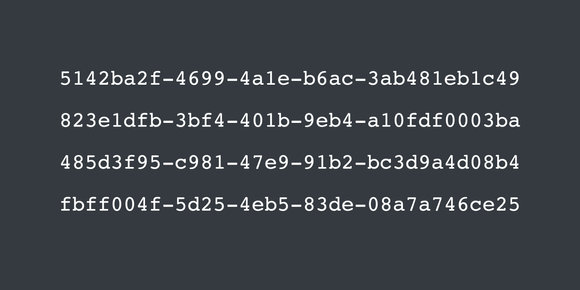
MySQL's UUID() function generates v1 UUIDs , which have a time component that make them unevenly distributed over short periods of time. We can define our own function to generate v4 UUIDs , which are random and therefore more evenly distributed.
Check out "Why You Should Use UUIDs for Your Primary Keys" for a reason to use UUIDs in databases.

Why You Should Use UUIDs for Your Primary Keys
Jan 30, 2020 · 4 min read
Universally unique identifiers (UUIDs) are 128-bit (16-byte) numbers that are designed to be globally unique, and as a result they make for great primary keys.
A custom uuid_v4() function
Here's the function, with comments explaining each group:
CREATE FUNCTION uuid_v4() RETURNS CHAR(36)
BEGIN
-- 1st group is 8 characters = 4 bytes
SET @g1 = HEX(RANDOM_BYTES(4));
-- 2nd group is 4 characters = 2 bytes
SET @g2 = HEX(RANDOM_BYTES(2));
-- 3rd group is 4 characters = 2 bytes, starting with a: 4
SET @g3 = CONCAT('4', SUBSTR(HEX(RANDOM_BYTES(2)), 2, 3));
-- 4th group is 4 characters = 2 bytes, starting with a: 8, 9, A, or B
SET @g4 = CONCAT(HEX(FLOOR(ASCII(RANDOM_BYTES(1)) / 64) + 8), SUBSTR(HEX(RANDOM_BYTES(2)), 2, 3));
-- 1st group is 12 characters = 6 bytes
SET @g5 = HEX(RANDOM_BYTES(6));
RETURN LOWER(CONCAT(@g1, '-', @g2, '-', @g3, '-', @g4, '-', @g5));
END;Here's a version without variables, to remove any overhead they might add:
CREATE FUNCTION uuid_v4() RETURNS CHAR(36)
BEGIN
RETURN LOWER(CONCAT(
HEX(RANDOM_BYTES(4)),
'-', HEX(RANDOM_BYTES(2)),
'-4', SUBSTR(HEX(RANDOM_BYTES(2)), 2, 3),
'-', HEX(FLOOR(ASCII(RANDOM_BYTES(1)) / 64) + 8), SUBSTR(HEX(RANDOM_BYTES(2)), 2, 3),
'-', hex(RANDOM_BYTES(6))
));
END;This uses RANDOM_BYTES() instead of RAND() because the former is non-deterministic and therefore more cryptographically secure, resulting in fewer UUID collisions in the end.
RANDOM_BYTES() was introduced in MySQL v5.6.17 (2014) , and is currently not available in MariaDB.
Putting it all together
Here's an example where a table users uses UUIDs for its primary key. Using CHAR(36) simplifies this example, but see "Making UUIDs More Performant in MySQL" for why you don't want to use strings for performance reasons.

Making UUIDs More Performant in MySQL
Nov 14, 2020 · 3 min read
MySQL does not have a native UUID type, so strings are often used instead, which come with large storage and performance costs.
CREATE TABLE users
(
id CHAR(36) NOT NULL,
name VARCHAR(255) NOT NULL,
PRIMARY KEY (id)
);
INSERT INTO users (id, name) VALUE (uuid_v4(), 'Bill Gates');
SELECT *
FROM users;If everything went well, at the end you should have table contents similar to:
+--------------------------------------+------------+
| id | name |
+--------------------------------------+------------+
| bdffcd96-a52e-40ed-8c3f-806899e5b6b4 | Bill Gates |
+--------------------------------------+------------+


